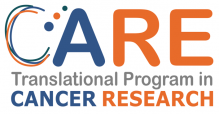Translational Program in Cancer Research (CARE)
The CARE Program is a multidisciplinary network of researchers who share common interests and resources in the field of cancer research. The program is located on the Can Ruti Campus and is an integral part of the core scientific structure of the IIS IGTP since its creation in 2022.

Scope and aim
Research carried out within CARE focuses on different forms of cancer, with the goal of accelerating the transfer of cutting-edge knowledge and technological progress to the clinic for the prevention, diagnosis and treatment of cancer. Through this program, the quality of cancer research will be enhanced and its impact on clinical practice will be maximised. The scientific and functional aims of CARE include:
- Promotion of the development and implementation of precision and personalised medicine.
- Advancement of basic and translational research towards innovation and technology transfer.
- Establishment of a collaborative and transversal network of clinical, translational and basic researchers.
- Implementation of an efficient working framework for researchers in order to increase research impact.
- Facilitation of the use of advanced computational tools in translational research practices.
Structure of the program
Institutions
Core members: IGTP, Germans Trias i Pujol University Hospital, Institut Català d'Oncologia (ICO).
Associate institutions: Josep Carreras Leukaemia Research Institute (IJC), IrsiCaixa, Universitat Autònoma de Barcelona (UAB).
Executive committee
Mireia Margelí, clinical research director
Miguel A Peinado, basic research director
Anna Martínez-Cardús, networking coordinator
Eduard Serra, scientific coordinator
Arola Fortian, training & communications coordinator
CARE Program nodes
Preclinical Models (Coordinator: Meritxell Carrió)
Immunology/Immunotherapy (Coordinators: Esther Ballana, Joan Climent)
Tumour Heterogeneity & Liquid Biopsy (Coordinators: Sofia España, Berta Martín)
Bioinformatics (Coordinators: Sergio Alonso, Bernat Gel)
Pathology-focused multidisciplinary groups
Taskforce for Colorectal Cancer (Coordinators: Eva Martinez-Balibrea, Núria Mulet)
Can Ruti Sarcoma Group (Coordinator: Eduard Serra)
Research groups
- B·ARGO - Badalona Applied Research Group in Oncology (IGTP - ICO)
- Molecular and Translational Pathology (IGTP - HUGTiP)
- Cancer Mechanisms and Pathways (IGTP)
- Cancer Genetics and Epigenetics (IGTP)
- Resistance, Chemotherapy and Predictive Biomarkers (IGTP -ICO)
- Endocrine Tumors (IGTP)
- Hereditary Cancer Group (IGTP)
- Translational Cancer Bioinformatics and Genomics (IGTP)
- Oncology Translational Research (IGTP)
- Cancer Persister Cell Biology (IGTP)
- Childhood Liver Oncology (IGTP)
- Host-Immune Interactions (IrsiCaixa)
- Cancer Genetics (IJC)
- Cancer Heterogeneity and Hierarchies (IJC)
2024 highlights
In 2024, CARE completed its consolidation. The different existing nodes unfolded a significant number of activities including regular meetings, technical capsules, etc. The Pathology-Focused Multidisciplinary Groups kept highly operative and new networks were consolidated.
- 1 Annual scientific meeting
- 8 Oncology courses and scientific meetings
- 3 Training capsules
- 2 Outreach activities
- 16 CARE translational seminars

